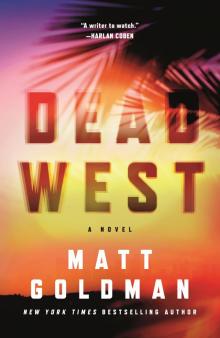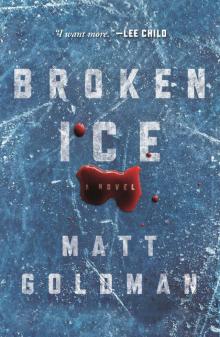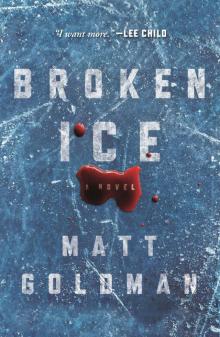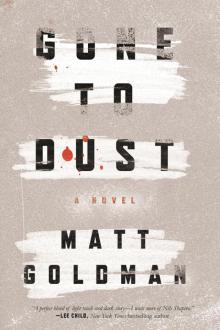- Home
- Matt Goldman
Broken Ice Page 7
Broken Ice Read online
Page 7
When he finished removing Lauren’s dressing, he looked at the wound, front and back. “Huh,” he said. “Never seen an arrow wound before. Probably ’cause I’m not a veterinarian.”
I smiled.
“Oh, that one you like.” He went to work cleaning and redressing the wound. “Who shot you?”
“No idea.”
“What were you hunting?”
“I wasn’t. I got shot in downtown St. Paul.”
“Seriously?”
I nodded.
“Permission to speak freely.”
“Granted.”
“That’s some fucked-up shit, brother. Fucked up. These times we live in. You can’t fix ’em. The only decent and honest thing a man can do is make his way through the world not being part of the problem.”
I tended to agree but didn’t respond. I liked Jameson White. I didn’t want to ruin that by getting into one of those sit-around-Starbucks conversations where the unemployed and out-of-the-know spew the answers to the world’s problems despite having had to scrounge under their couch cushions for change to buy their caramel macchiato.
The big man finished dressing my wound, went over my medication schedule, packed his bag, and put on his coat. I asked if Micaela had given him my cell. He said she had, so I asked him to call me after he left and tell me if the Latino kid was still sitting on the sidewalk outside my building. He said he would and that he wanted to change my dressing three times a day. He’d come to wherever I was.
I thanked him and he left. A minute later he called and said the Latino kid was still sitting on the bucket. “Want me to make him leave?”
“No,” I said. “You’re a nurse practitioner, remember? You don’t want to be part of the problem.”
“That’s right. I don’t. Only trouble with being the good guy is it’s kind of boring. Guess I’ll just have to find my thrills elsewhere.”
I hung up and texted a thank-you to Micaela. She didn’t respond.
I put on a shirt and slipped my feet into a pair of Blundstones because I had one functional arm and they didn’t have laces. I was thinking about moving the dirty dishes from the sink to the dishwasher when the loading dock door opened and my Volvo drove into the building. The engine died then the big door lowered as Ellegaard got out of the car. The passenger door opened and Anne Engstrom got out, a windshield over each eye and holding her sad excuse for a dog.
“Hope we didn’t wake you,” said Ellegaard as he led Anne Engstrom up the loading dock steps.
“Not at all. My new nurse just left.”
The dog yipped. I considered my sink’s industrial garbage disposal.
“We found her, Mr. Shapiro,” said Anne. “We found Linnea.”
10
Anne clutched the tiny dog and climbed up the loading dock stairs. She wore jeans rolled at the cuff over yellow Wellingtons and a 1970s ski sweater, black with a band of horizontal stripes in violet, royal, and powder blue. It was like she had a personal shopper who shopped only at garage sales. Between Anne Engstrom’s clothes and giant glasses and severe bangs and the tiny creature she carried everywhere, the woman might as well have hired a spotlight to follow her around.
“The police called this morning,” Anne said. “They asked us to come down to the station. Roger was at a business meeting. I tried to call him, but he didn’t answer his cell. I was afraid the police might have terrible news. I didn’t want to go alone, so I called your office. Anders offered to go with me.”
“It was 6:30,” said Ellegaard. “I wanted to let you sleep.”
I said, “It sounds like the police didn’t have terrible news.”
Anne sat in the leather chair across from the sofa. “Linnea’s in Madison, Wisconsin.”
I wondered why Ellegaard drove Anne over to meet in person rather than picking up the phone, especially since he was so concerned about me getting enough sleep. This is real life, not a soap opera. People don’t just drop by to have conversations they could have over the phone. I said, “Have you talked to Linnea?”
“Not yet,” said Anne, “but I hope to soon.”
“Who spotted her?” My skepticism must have leaked into my voice because Ellegaard remained standing and his mouth got small and defensive.
“We don’t know yet,” he said. “Her cell logged on to the Wi-Fi at a Starbucks on the University of Wisconsin campus. Linnea checked her Facebook page, logged into her bank, and then logged into her school account to check her midterm test grades.”
“You both seem pretty confident it’s Linnea, not just someone using her phone.”
“That’s just the thing,” said Anne. “The bank app on her phone allows her to log in using her fingerprint instead of a password. And that’s what she did. So it has to be Linnea.”
“When was this?”
“Last night,” said Ellegaard. “Logged into Starbucks’ Wi-Fi at 9:24 P.M. Logged off at 9:36 P.M.”
“Have the Madison police interviewed anyone to get a visual ID?”
“They’re doing that right now. And there’s surveillance video. Madison PD is sending us a clip covering 9:00 P.M. to 10:00 P.M. St. Paul should have it any minute if they don’t have it already. That will give us a positive ID.”
Then I understood why Ellegaard drove Anne over rather than call. The coat factory offered no place for a private conversation. No room where we could escape from Anne to discuss a grizzly suspicion or shout it out with each other, something which, as respectable businesspeople, we’d never do in front of a client. That’s where Ellegaard miscalculated.
I said, “So I suppose you two are here to tell me our investigation is over.”
I wasn’t going quietly. Ellegaard realized his plan had failed. “I know it’s not the total win you like but—”
“Don’t say total win. Don’t buzzword me.” I turned to Anne. “Did you call off the investigation without talking to Roger?”
“I—”
“Was it even your idea to call it off or was it Ellegaard’s?”
“Shap,” said Ellegaard, looking dead at me through the tops of his eyes, “don’t do this.”
“Don’t do what? I’m not begging for work here, E. I have plenty of work thanks to you. I’d just like to know how the mother of a seventeen-year-old girl stops looking for the kid because her phone was detected in Madison. And even if the surveillance video does show it’s Linnea, all that means is you know where she was eleven hours ago. Not now. She could be—”
Ellegaard cut me off. “We suspect the video is going to show Linnea with one of several friends who now attend Madison. Two are from Warroad. Five are from when the Engstroms lived in Minneapolis. That’s how we’ll find her.”
“Have the police contacted those friends? Have you, Mrs. Engstrom?”
“Of course I have,” said Anne. “And to be honest, I’m finding your attitude a tad on the difficult side.”
“Let’s not be honest about our attitudes—no one’s going to walk away from that looking good. And you two are acting like I was investigating Linnea’s disappearance then just by coincidence tripped and fell on an arrow. Well, that’s not what happened. It wasn’t a coincidence. So maybe I’m looking for more than a seventeen-year-old girl.” Anne sat back in the chair and looked about as big as her goddamn dog. I let her discomfort fester then said, “So what did Linnea’s Madison friends say?”
Anne sighed, scratched between the Yorkie’s ears and said, “Well, of course, they denied seeing Linnea or knowing anything about where she is. But that’s what you’d expect them to say, isn’t it?”
“Depends what kind of friends they are.”
“And what does that mean?”
Ellegaard paced with arms folded.
“It means if Linnea ran away, what did she run away from? Or maybe who did she run away from? And were her reasons legitimate enough that her good, kind friends are protecting her from something she needs protecting from? Or did Linnea just take off for shits and giggles, and her friends are assholes
for playing along and costing her parents a load of dough and emotional havoc and the police precious resources? Who’s the real problem here, Anne? Is it Linnea? Or is it you and Roger?”
“Shap!” said Ellegaard. His face reddened, making his blond eyebrows stand out like neon caterpillars. “That’s enough.”
“And how important is Roger’s business meeting that he can’t be reached about his missing daughter? Maybe you two like the attention of all this more than you realize. Or maybe it’s exactly as much as you realize.”
Ellegaard’s phone dinged. He looked at the screen. Anne looked down at the shaky creature in her lap.
I said, “Is that email from St. Paul?”
Ellegaard looked at me, and Anne looked at him. My old friend and new business partner seemed resigned to this not going his way. He’d hoped the Engstrom case was over. He said, “The St. Paul police have reviewed the Starbucks security camera footage and weren’t able to spot anyone matching Linnea’s description. “But they said”—he read the email aloud—“‘the Starbucks location is crowded with college students, many wearing hats, some wearing hoodies with the hoods up. Please review the attached footage and look for familiar movements or gestures or known friends/acquaintances that suggest Linnea’s presence.’” Ellegaard looked to Anne. “It’s your call, Anne. We can bow out now and you can deal directly with SPPD and Madison Police. Or we can review this footage with you, and then you can decide whether or not you’d like our firm to stay on the case.”
Our firm he said, as opposed to us.
“Well,” Anne said, removing her windowpanes and rubbing the gray eyes under her chestnut bangs, “I wish I didn’t have to make any decisions without talking to Roger first. But I suppose I’d like to watch the surveillance video now if possible. You work the rest of the day, help me communicate with the police, then I’ll discuss with Roger whether or not you should stay on.”
After a few minutes of messing around with settings and devices, we streamed the video from Ellegaard’s phone to my TV. The screen was split into four sections, each showing the angle of a fixed camera. We watched the entire hour and paid special attention to the twelve minutes Linnea’s phone was logged into Starbucks’ Wi-Fi as indicated by a running time code at the top of the screen. We saw faces clearly when students ordered and picked up coffee. Other than that, we saw high-angle shots of people sitting at tables, conversing, studying, surfing the Web on their phones and computers. During the hour-long clip, Anne saw nothing that suggested one of the patrons might be Linnea. She saw none of Linnea’s friends, no familiar articles of clothing, no familiar hand gestures or postures or gaits, those little telltales that are almost impossible to hide.
When it was over, we went back to Linnea’s supposed twelve-minute log-in time and watched again, focusing on anyone looking at their cell phone. That narrowed the potential Linneas by half, but even pausing the video several times, no one appeared to be her.
“That’s disappointing,” said Anne. She removed her oversize glasses again and set them on the coffee table. Her eyes were red and wet. Ellegaard grabbed a box of tissues off the end table and handed them to her. She dabbed her face and blew her nose. “I suppose this means we’re back to where we started.”
I said, “All this video proves is she wasn’t in Starbucks or at least she wasn’t in an area covered by their security cameras. Every coffee place I know has a Wi-Fi signal that extends beyond the physical location. Linnea could have been outside, next door, in an apartment above Starbucks if it’s that kind of building. We need Madison PD to request surveillance video from neighboring businesses. Also from the parking lot or street if that video exists.”
Ellegaard slouched like someone had let the air out of him. He closed his eyes and rubbed his forehead. His red face had faded to a dull pink. “Shap’s right,” he said. “I’ll get our junior investigator, Annika, on the phone with SPPD and Madison. See if we can find more surveillance footage. Anne, why don’t you try Roger again. We need to keep him in the loop.”
Anne nodded, returned the picture windows to her face, and picked up her phone. Ellegaard texted Annika then looked at me and shook his head. He never wanted me working on this case, now the entire company was. It’s tough for a Boy Scout to run a company. Too many merit badges conflict with each other. If he wanted to earn one for the Linnea Engstrom case, it thwarted his effort on the BrainiAcme case. He couldn’t earn both, not at the same time anyway. Ellegaard didn’t have those problems wearing a gold shield for Edina PD. There, most everything was straightforward. He didn’t celebrate victories—he expected them. Failure was the exception. He’d built up no resistance to it, now it was knocking him off his feet.
“No answer,” said Anne. “Maybe he left his phone in the car. It happens sometimes.”
“When his daughter is missing?”
“No, I suppose not.”
“Do you know where he’s meeting?” I said.
“He didn’t say.”
“Is there anyone you can check with? His assistant back in Warroad, maybe?”
She nodded then stood and meandered into the kitchen and made the call.
I approached Ellegaard, who seemed to be somewhere else. “Hey E, when you drove in, did you notice a Latino kid sitting on a white bucket against the building?”
“Yeah. You know him?”
“Never seen him before today.”
“Want me to see if he’s still there?”
“No, I’m going to head out in a minute. I’ll take a look then.”
“You should stay home and rest.”
“Winnie Haas wants to talk to me without Ben around. She’s working from home this morning. Said I’d meet her around 10:00. I had planned on tailing Ben, but his mom might have something important. I can drop you and Anne wherever you need to go on the way.”
“You’re okay to drive?”
“I’m fine. I’m not on any pain meds, and Micaela hired me a full-time nurse.”
“Is her name Lauren?”
“Jameson.”
“Is that a joke?”
“No. I have a nurse practitioner named Jameson.”
Anne walked into our conversation. “Roger’s assistant has no idea where he is. She wasn’t aware he had a meeting this morning. The only thing Roger has on the books is something this afternoon with Honeywell. Honeywell wants to push it back half an hour. She tried to reach him about that, but couldn’t.”
Ellegaard looked at me and said, “Let’s go.” But his eyes said something else. We all got in the Volvo, and when I backed into the street, the Latino kid was still sitting on the white plastic bucket. I stopped the car. Ellegaard rolled down his window. “Can we help you with something?”
The kid kept his hands in his pockets and looked at us with his left eye, his right eye lost inside the jacket’s hood. “You Nils Shapiro?” He had an accent from a Spanish-speaking country. Maybe Mexico. Maybe Guatemala. Probably not Spain.
“No,” said Ellegaard. “Why?”
“I got a message for Nils Shapiro.”
“I can get it to him,” said Ellegaard.
“Got to give it to him myself.”
“Why don’t you take your hands out of your pockets?”
“Is that him driving the car?”
“I got friends in the Minneapolis Police Department.” Ellegaard held up his phone. “I make one call, you’re going to have a rough day.”
“I gotta give a message to Nils Shapiro.”
“What’s happening?” said Anne from the backseat.
“Lie down,” I said.
“What?”
“Lie the fuck down.”
11
“Oh my God.” Anne unfastened her seat belt and dropped onto the backseat. “Oh my God,” she repeated between a whisper and a squeal.
The kid stood up off the bucket. Ellegaard had his gun out before the kid’s knees straightened.
“Dude, dude, dude!” said the kid. “What are you d
oing?”
I jumped out of the car, ran around the front, and said, “Hands! Now!” The kid yanked his hands out of his pockets. They held nothing. “Put ’em above your head!” He did. My left hand was in the sling. I reached into his jacket pockets with my right and removed his wallet, a smartphone, and half a Snickers. I dropped them to the sidewalk, spun him around, and patted him down, the empty left sleeve of my jacket half a step behind like the languid trunk on a child’s elephant costume.
All that moving around hurled swords through my shoulder, but the adrenaline kept me from passing out.
“What the fuck, man?”
The kid had nothing else on him. “Who are you?”
“Ernesto Cuellar. That’s the truth. Look in my wallet.”
“Back on the bucket.” He sat. I picked up his wallet and stood to the side so Ellegaard had a clean shot at him. Ernesto Cuellar carried a provisional Minnesota driver’s license and lived on East Thirty-First Street near Powderhorn Park. He was sixteen years old. The bill compartment contained a few ones, a five, and Ulysses S. Grant’s big head on a crisp fifty. I took out my phone, snapped a picture of his ID, returned it to the wallet, and handed it to him. “I’m Nils Shapiro. What’s the message?”
“Can I have my Snickers and my phone?”
“You can have your Snickers.”
He grabbed it and put it back in his pocket.
“I don’t have all day, Ernesto. And you should probably get back to school. I’m sure it’s killing you not to be there.”
He looked up at me, his dark brown eyes full of fear. “Stop looking for Linnea Engstrom. She’s okay and doesn’t want to be found.”
“Is that the message?” He nodded. “Who sent it?”
“I don’t know.”
“Not good enough. Who sent the message?”
“I don’t know! Someone put an envelope in my locker. It had a fifty-dollar bill and a note that said your name and where you live and the message I should give you and after I gave it to you I would get another fifty.”
“You know what, Ernesto? I think you’re full of shit.”
“It’s the truth.”

 The Shallows--A Nils Shapiro Novel
The Shallows--A Nils Shapiro Novel Dead West
Dead West Broken Ice
Broken Ice Broken Ice--A Novel
Broken Ice--A Novel Gone to Dust
Gone to Dust